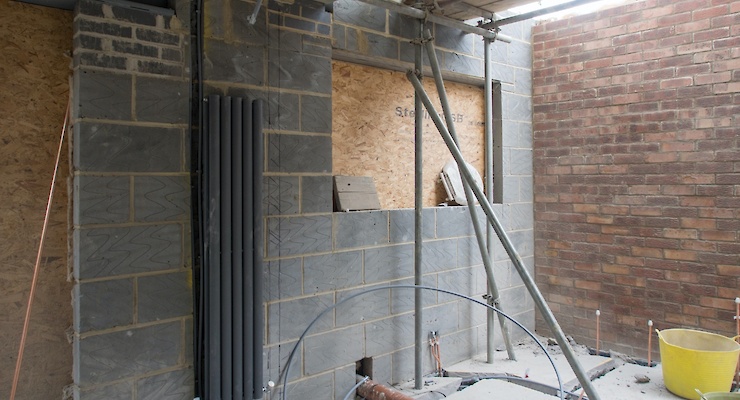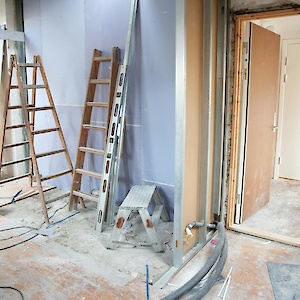


Head of Content

Head of Bridging and Commercial

Mortgages are available for renovation purposes, but can you get one if you’re a first-time buyer? Read our guide to find out all you need to know.
Are there renovation mortgages for first-time buyers?
Yes, but they can be difficult to come by if the renovations the property needs are extensive. Some lenders who offer these mortgages expect the borrower to have prior experience with renovation projects, so it can help your cause if you have refurbished a property before.
This doesn’t need to be a fixer-upper that you have restored to live in. If you have renovated homes in a professional capacity, this may work in your favour, but the good news is that there are also lenders who require no prior experience in this area at all.
You can read more about renovation mortgages in our standalone guide.
How do these mortgages work?
There are no exclusive renovation mortgages for first-time buyers, so the deals you will be applying for are no different to the renovation mortgages available to everyone else.
With a renovation mortgage, you can borrow the funds to buy a property that needs repairs as well as capital to carry out the work itself. The funds would usually be released in stages as the lender will be keen to review the condition of the property after the work has been completed, to assess its value and rule out there being any outstanding issues.
If you are a first-time buyer with the funds to buy a fixer-upper property outright, it is also possible to take out a mortgage to cover the renovation costs only.
Eligibility criteria
Lenders tend to subject renovation mortgage applications to extra scrutiny to ensure their plans are achievable. The criteria for first-time buyers is as follows:
- Renovation experience: This can be beneficial but is not usually a necessity, unless the renovation project is an extensive overhaul. You may have more mortgage options available if you have prior property renovation experience.
- Property condition: If the property you are buying is derelict, uninhabitable or needs to be converted, you may not qualify for a renovation mortgage. Specialist types of finance, such as self-build mortgages, are available for more extensive jobs like these.
- Planning permission: Consent from your local authority is needed if you are making extensive changes to the property or are buying a listed building. Head to the government’s planning portal for more information or to submit a request.
Deposit requirements
You will need to put down slightly more deposit than someone who is applying for a standard residential mortgage. Expect the lender to request at least 15-20% of the property’s projected value post-renovation.
Other factors
As a first-time buyer seeking a renovation mortgage, the overall quality of your application must be good. Having clean credit, being under 75 for the duration of the mortgage term and having plenty of income proof will help your cause.
How to get a first-time buyer renovation mortgage
Follow the steps below to boost your chances of successfully securing a mortgage for renovation purposes as a first-time buyer:
Tally up the total cost: Be sure to factor in any project management costs when calculating the total amount you need to borrow. If possible, set aside an emergency fund for unexpected costs, which can emerge at any point in a renovation project.
Draw up a timeframe: It’s important to be realistic about how long the project will likely take as your lender will want you to be transparent about this. If you are unsure about how long specific renovation tasks will take, speak to a local tradesman.
Speak to a mortgage broker: There are mortgage brokers who specialise in renovation mortgages and first-time buyers on our books. They can offer you bespoke advice about your plans and help you get the best outcome.
You can start comparing mortgage rates and deals or access a free, no-obligation chat with a broker who specialises in renovation mortgages below:

Secure your renovation mortgage today!
Alternatives to consider
There are times when a renovation mortgage won’t fit your needs. Applicants tend to consider self-build mortgages as a better alternative in the following scenarios:
- The property is derelict and needs extensive work to make it mortgageable
- The property is classed ‘uninhabitable’ because it has no bathroom or kitchen
- A full conversion is needed (for example, a barn that will become a home)
One of the issues you may encounter here as a first-time buyer is that self-build mortgage criteria can be stringent and most lenders will expect you to have owned a property before as a standard requirement, while development experience will be considered a bonus.
Bridging finance
While it’s not impossible to get a self-build mortgage as a first-time buyer, there are other options to consider if you don’t fit the criteria for one.
Your main back-up options would be a bridging loan. With this type of short-term finance, you can secure the funds you need quickly, carry out the development work and remortgage based on the property’s post-renovation value to serve as your exit strategy.
If you’re unsure whether to use a renovation mortgage, a self-build mortgage or a bridging loan for your project, get in touch and one of our brokers will weigh up each option with you.
Why choose Teito for your mortgage needs?
On Teito you can compare first-time buyer mortgage rates from across the market for free and access support from a broker who specialises in renovation mortgages.
Here are just some of the reasons why people source their mortgage through us:
- You can access first-time buyer mortgage rates in seconds
- Our brokers often have access to exclusive renovation mortgage deals
- We are 5-star rated on leading review websites
- You can secure an agreement in principle in minutes
Ready to get started comparing deals from across the market and take advantage of a free, no-obligation chat with a specialist broker? Get started here.
FAQs
With a renovation mortgage, you can either find a project manager to oversee the project for you or take on this role yourself. Whether you should hire a professional will depend on how much expertise you have in this area. If you have the know-how, it could save you a significant amount to project manage yourself, but encountering a scenario you’re not qualified to handle could result in delays to completion or issues with the build quality.
Choosing an Adviser
Selecting a qualified and experienced mortgage adviser is of great importance. To choose a suitable adviser, evaluate their qualifications, experience, and reputation, and ensure they are regulated by the Financial Conduct Authority (FCA).
Read reviews from previous clients and make sure they provide a clear explanation of the products and services they offer, as well as the fees and charges associated with them.

























































































































































